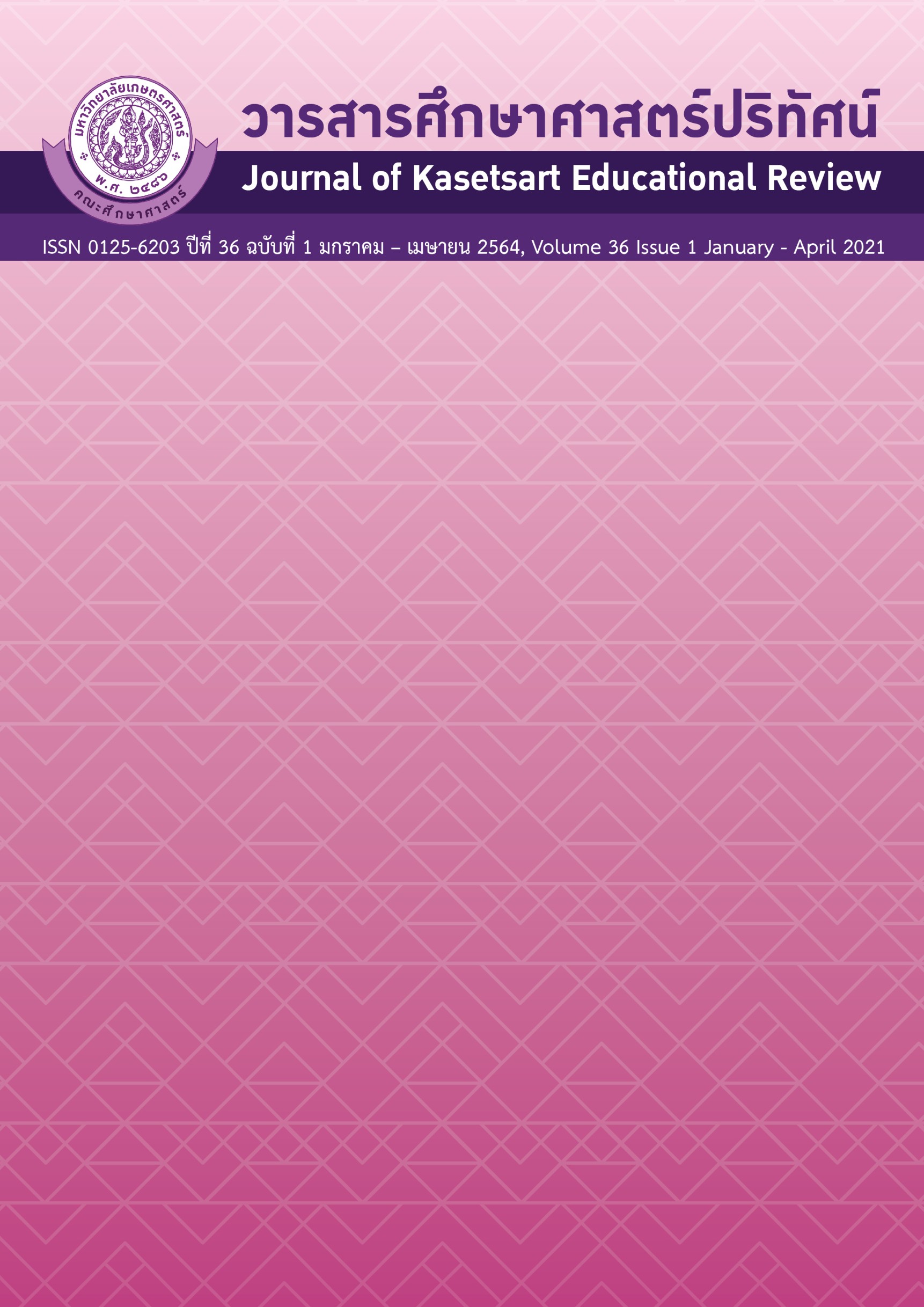ทักษะการโต้แย้งทางวิทยาศาสตร์ของนักศึกษาครูวิทยาศาสตร์ สาขาการสอนเคมี
Pre-service Chemistry Teachers’ Scientific Argumentation Skills and Science Perspective
คำสำคัญ:
Scientific Argumentation skills, Pseudo-science Issues, Pre-service teachersบทคัดย่อ
การวิจัยนี้มีวัตถุประสงค์เพื่อศึกษาทักษะการโต้แย้งทางวิทยาศาสตร์และมุมมองทางวิทยาศาสตร์ กลุ่มเป้าหมายของการวิจัยคือนักศึกษาครู สาขาวิชาเคมี ชั้นปีที่ 4 ภาคเรียนที่ 2 ปีการศึกษา 2562 ของมหาวิทยาลัยราชภัฏในเขตภาคกลาง จำนวน 97 คน โดยเก็บรวบรวมข้อมูลจากแบบวัดทักษะการโต้แย้งทางวิทยาศาสตร์ผ่านประเด็นวิทยาศาสตร์เทียมที่มีเนื้อหาจำเพาะต่อวิชาเคมี จากนั้นผู้วิจัยวิเคราะห์ข้อมูลด้วยการหาค่าความถี่และร้อยละของคำตอบ และสร้างข้อสรุป ผลการวิจัยพบว่า นักศึกษาครู สาขาวิชาเคมีมีทักษะการโต้แย้งทางวิทยาศาสตร์ที่ไม่เพียงพอ อีกทั้งยังมีนักศึกษาครูถึงร้อยละ 37.50 ที่มีมุมมองเป็นวิทยาศาสตร์เทียม ซึ่งผลการวิจัยนี้จะเป็นประโยชน์ต่อการพัฒนาวิชาชีพครูต่อไป
เอกสารอ้างอิง
and Enhancing Pre-service Science
Teachers’ Self-Efficacy to Teach Science
Through Argumentation: Challenges and
Possible Solutions. International journal
of science and mathematics education,
14, 1255–1273.
Berland, L. K., and Hammer, D. (2012).
Framing for scientific argumentation.
Journal of Research in Science Teaching,
49(1), 68–94.
Besley J. C., Dudo A., & Storksdieck M. (2015).
Scientists’ Views About
Communication Training. Journal of Research in Science Teaching. 52(2), 199-220.
Bybee, R. W. (2008). Scientific literacy,
environmental issues, and PISA 2006:
The 2008 Paul Brandwein lecture.
Journal of Science Education and
Technology, 17(6), 566–585.
Cavagnetto A. R. (2010). Argument to Foster
Scientific Literacy: A Review of Argument
Interventions in K-12 Science Contexts,
Review of Education Research, 80(3),
336-371.
Cetin S. P., Dogan N., & Kutluca A. Y. (2014).
“The Quality of Pre-service Science
Teachers’ Argumentation: Influence of
Content Knowledge. Journal Science
Teacher Education, 25, 309-331.
Christenson N., Gericke N., & Rundgren S. C.
(2017). Science and Language Teachers’
Assessment of Upper Secondary
Students’ Socioscientific Argumentation,
International Journal of Science and
Math Education, 15, 1403–1422.
Dawson, V. M., & Venville, G. (2009). High
school students’ informal reasoning and
argumentation about biotechnology: An
indicator of scientific literacy?
International Journal of Science
Education, 31(11), 1421–1445.
Driver, R., Newton, P., & Osborne, J. (2000).
Establishing the norms of scientific
argumentation in classrooms. Science
Education, 84, 287–312.
Espeja G. A. & Lagaron C. D. (2014). Socio-
scientific issues (SSI) in initial training of
primary school teachers: Pre-service
teachers’ conceptualization of SSI and
appreciation of the value of teaching
SSI. Proceeding of International
Conference on University Teaching and
Innovation, Spain, July. 2-4, 2014, pp.
80-88.
Evagorou, M, Jimenez-Aleixandre, M. P., &
Osborne, J. (2012). “Should we kill the
grey squirrels?” A study exploring
students’ justifications and decision-
making. International Journal of Science
Education, 34(3), 401–428.
Iordanou K., & Constantinou C. (2014).
Developing pre-service teachers'
evidence-based argumentation skills on
socio-scientific issues. Learning and
Instruction, 34, 42-57.
Jantarakantee E. (2016). Instruction for
Promoting Argumentation Skill in
Science Classroom. Journal of Yala
Rajabhat University, 11(1), 217-232. (in
Thai)
Kolstø, S. D., & Ratcliffe, M. (2007). Social
aspects of argumentation. In S. Erduran
& M. P. Jimenez Aleixandre (Eds.),
Argumentation in science education:
Perspectives from classroom-based
research (pp. 117–135). London:
Springer.
Lekpet K., & Pitiporntapin S. (2015). New
Graduated Pre-Service Science Teachers’
Perspectives of Nature of Science and
Beliefs of Pseudoscience. Journal of
Research Unit on Science, Technology
and Environment for Learning, 6(1), 95-
105. (in Thai)
Lin, H. S., Hong, Z. R. & Huang, T. C. (2012).
The role of emotional factors in building
public scientific literacy and engagement
with science. International Journal of
Science Education, 34(1), 25–42.
Losh, S. C., & Nzekwe, B. (2010). Creatures
in the classroom: Preservice teacher
beliefs about fantastic beasts, magic,
extraterrestrials, evolution and
creationism. Science and Education, 20,
473–489.
McNeill K., & Pimentel D. (2010). Scientific
discourse in three urban classrooms:
The role of the teacher in engaging high
school students in argumentation.
Science Education, 94(2), 203–229, 2010.
Ministry of Education. (2011). Notification of
the Ministry of Education: Qualifications
framework for higher education in
education.
Ministry of Education. (2019). Notification of
the Ministry of Education: Qualifications
framework for higher education in
education.
Sadler, T. D., & Zeidler, D. L. (2004). The
morality of socioscientific issues:
Construal and resolution of genetic
engineering dilemmas. Science
Education, 88, 4–27.
Sampson V., & Blanchard M. R. (2012).
Science Teachers and Scientific
Argumentation: Trends in Views and
Practice. Journal of Research in Science
Teaching, 49(9), 1122–1148.
Thanaboonsombut. B. (2010). Pseudo-
science. Journal of Material Technology,
59, 64-70. (in Thai)
Zohar, A., & Nemet, F. (2002). Fostering
students’ knowledge and argumentation
skills through dilemmas in human
genetics. Journal of Research in Science
Teaching, 39, 35–62.
ดาวน์โหลด
เผยแพร่แล้ว
ฉบับ
ประเภทบทความ
สัญญาอนุญาต
บทความทุกบทความเป็นลิขสิทธิ์ของวารสารคณะศึกษาศาสตร์ มหาวิทยาลัยเกษตรศาสตร์ วิทยาเขตบางเขน
วารสารศึกษาศาสตร์ปริทัศน์ (Kasetsart Educational Review)






